
Hannah Overbye-Thompson
@overbye.bsky.social
PhD candidate @ UC Santa Barbara Comm | I study how people detect, perceive & respond to AI/algorithmic bias | On the market!
https://www.hannahoverbye.com/
https://www.hannahoverbye.com/
I've noticed w/research it's often hard to find validated measures of constructs without hobbling together scales from multiple papers; now when possible I try to contribute by validating scales. Below is a scale that I hope is helpful that measures the perceptual attributes of DOI + reinvention 🧪



October 16, 2025 at 8:41 PM
I've noticed w/research it's often hard to find validated measures of constructs without hobbling together scales from multiple papers; now when possible I try to contribute by validating scales. Below is a scale that I hope is helpful that measures the perceptual attributes of DOI + reinvention 🧪
Fabulous study by @felix-dietrich.de @aliciaernst.bsky.social @rkreling.bsky.social et al., examining how algorithmic curation affects music streaming UX. Key finding: More algorithmic recommendations = less enjoyment, BUT listening sessions w/algorithmic curation were perceived as more novel 🧪


October 14, 2025 at 5:32 PM
Fabulous study by @felix-dietrich.de @aliciaernst.bsky.social @rkreling.bsky.social et al., examining how algorithmic curation affects music streaming UX. Key finding: More algorithmic recommendations = less enjoyment, BUT listening sessions w/algorithmic curation were perceived as more novel 🧪
New study (2025) examines how AI autonomy affects user agency and attitudes. Key finding: AI autonomy triggers psychological reactance through threats to freedom, BUT personalization benefits cancel this out + users with higher agency feel more threatened by autonomous AI 🧪
doi.org/10.1080/0883...
doi.org/10.1080/0883...


October 9, 2025 at 9:53 PM
New study (2025) examines how AI autonomy affects user agency and attitudes. Key finding: AI autonomy triggers psychological reactance through threats to freedom, BUT personalization benefits cancel this out + users with higher agency feel more threatened by autonomous AI 🧪
doi.org/10.1080/0883...
doi.org/10.1080/0883...
New study (2025) examines if people can detect bias in AI training data. Key finding: Training data cues were largely ineffective; users relied on AI performance instead to judge bias + consistent with prior work on AI bias, the majority of participants failed to notice any bias in training data 🧪

September 23, 2025 at 6:06 PM
New study (2025) examines if people can detect bias in AI training data. Key finding: Training data cues were largely ineffective; users relied on AI performance instead to judge bias + consistent with prior work on AI bias, the majority of participants failed to notice any bias in training data 🧪
New paper (2025) by @len-s.bsky.social proposes the PMSIS model: parents can use racially diverse entertainment media + "foreground co-viewing" + active mediation to improve children's intergroup socialization 🧪 doi.org/10.1093/annc...
Great work Sovannie 👏👏👏 #commsky
Great work Sovannie 👏👏👏 #commsky


September 3, 2025 at 4:24 PM
New paper (2025) by @len-s.bsky.social proposes the PMSIS model: parents can use racially diverse entertainment media + "foreground co-viewing" + active mediation to improve children's intergroup socialization 🧪 doi.org/10.1093/annc...
Great work Sovannie 👏👏👏 #commsky
Great work Sovannie 👏👏👏 #commsky
New study by @janadreston.bsky.social @anneo.bsky.social & @germanneubaum.bsky.social reveals how users understand algorithms. Key findings: 71% have a basic understanding of algorithms but only 33% can explain how they work; users see themselves as passive actors when interacting with algorithms 🧪

August 29, 2025 at 9:43 PM
New study by @janadreston.bsky.social @anneo.bsky.social & @germanneubaum.bsky.social reveals how users understand algorithms. Key findings: 71% have a basic understanding of algorithms but only 33% can explain how they work; users see themselves as passive actors when interacting with algorithms 🧪
Excited to share my new paper with @garciaerick.bsky.social Xinyi Zhang & @laurentwang.bsky.social.
We ask: Do people see algorithmic bias as a risk—and do they feel capable of addressing it? Answer... It depends! More below 👇🧪 #commsky
doi.org/10.1080/1044...
We ask: Do people see algorithmic bias as a risk—and do they feel capable of addressing it? Answer... It depends! More below 👇🧪 #commsky
doi.org/10.1080/1044...

August 27, 2025 at 3:14 PM
Excited to share my new paper with @garciaerick.bsky.social Xinyi Zhang & @laurentwang.bsky.social.
We ask: Do people see algorithmic bias as a risk—and do they feel capable of addressing it? Answer... It depends! More below 👇🧪 #commsky
doi.org/10.1080/1044...
We ask: Do people see algorithmic bias as a risk—and do they feel capable of addressing it? Answer... It depends! More below 👇🧪 #commsky
doi.org/10.1080/1044...
New study by Aquino et al. provides a fabulous look at differing opinions about algorithmic bias held by healthcare professionals. 72 experts had 3 key disagreements: whether bias exists (most say yes, some no), who's responsible for fixing it & whether to include race/ethnicity data in AI systems 🧪




August 21, 2025 at 5:48 PM
New study by Aquino et al. provides a fabulous look at differing opinions about algorithmic bias held by healthcare professionals. 72 experts had 3 key disagreements: whether bias exists (most say yes, some no), who's responsible for fixing it & whether to include race/ethnicity data in AI systems 🧪
New study by @drjt.bsky.social examines if attention control explains the 🔗 between inspection time tasks and intelligence. Key finding: attention control fully mediated the inspection time-intelligence relationship + people with better sustained attention showed less performance decline over time 🧪

August 21, 2025 at 1:40 AM
New study by @drjt.bsky.social examines if attention control explains the 🔗 between inspection time tasks and intelligence. Key finding: attention control fully mediated the inspection time-intelligence relationship + people with better sustained attention showed less performance decline over time 🧪
After a great summer teaching Social Networks at UCSB, I wanted to share 4 of my favorite network examples we explored in class 🧪🧵
1. Who Will Be the Next Pope?
2. The Hidden Network of Trees 🌳
3. The Beer Graph 🍺
4. The Oracle of Bacon 🥓🎬
1. Who Will Be the Next Pope?
2. The Hidden Network of Trees 🌳
3. The Beer Graph 🍺
4. The Oracle of Bacon 🥓🎬
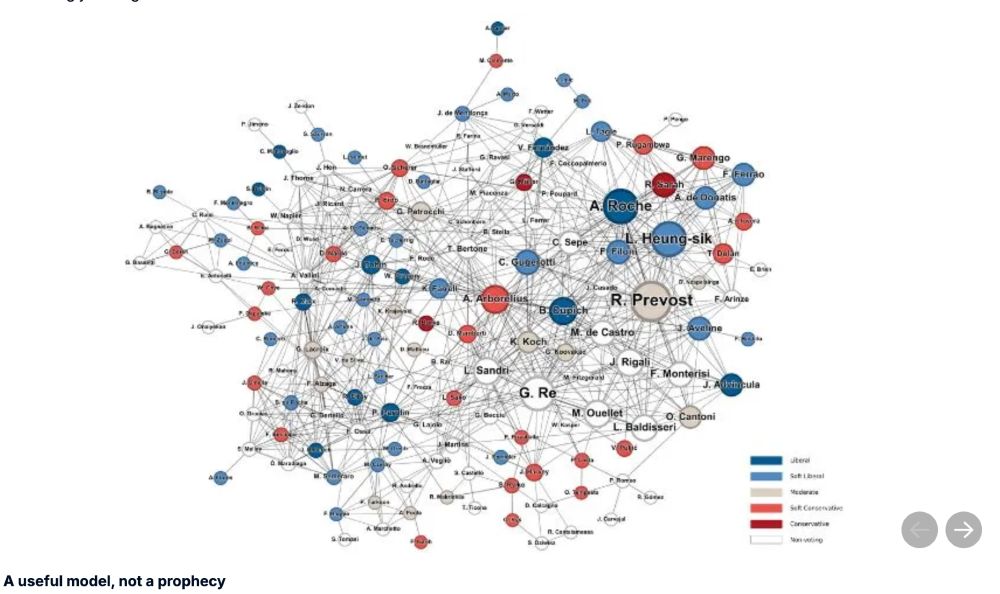
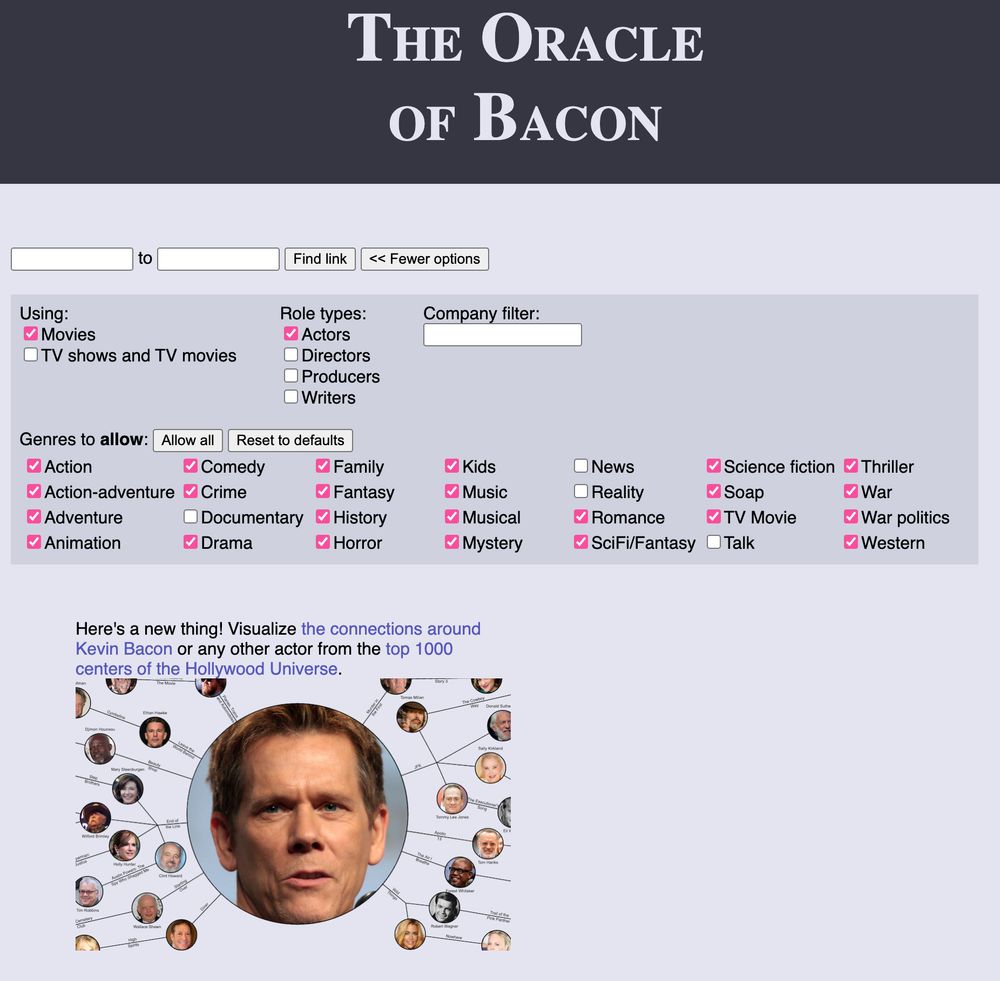
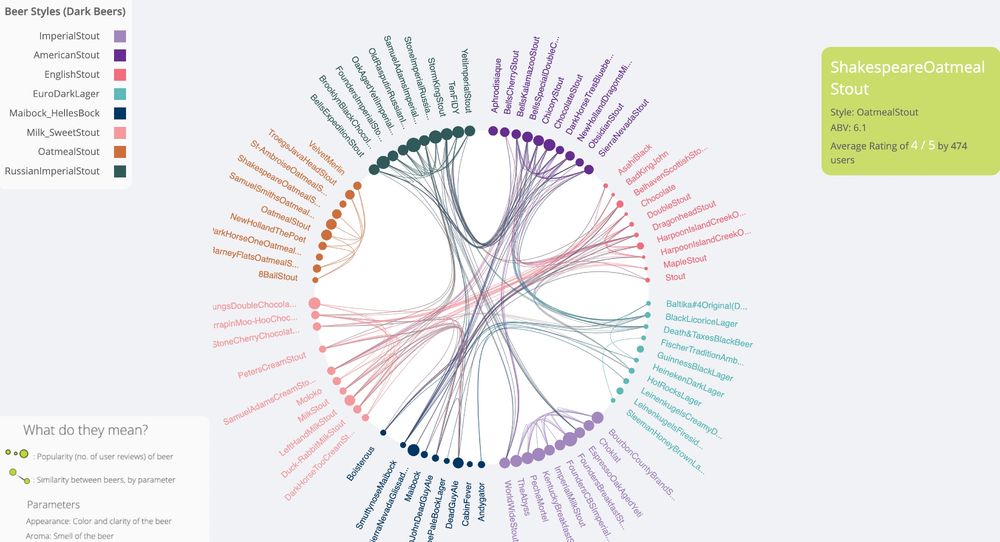
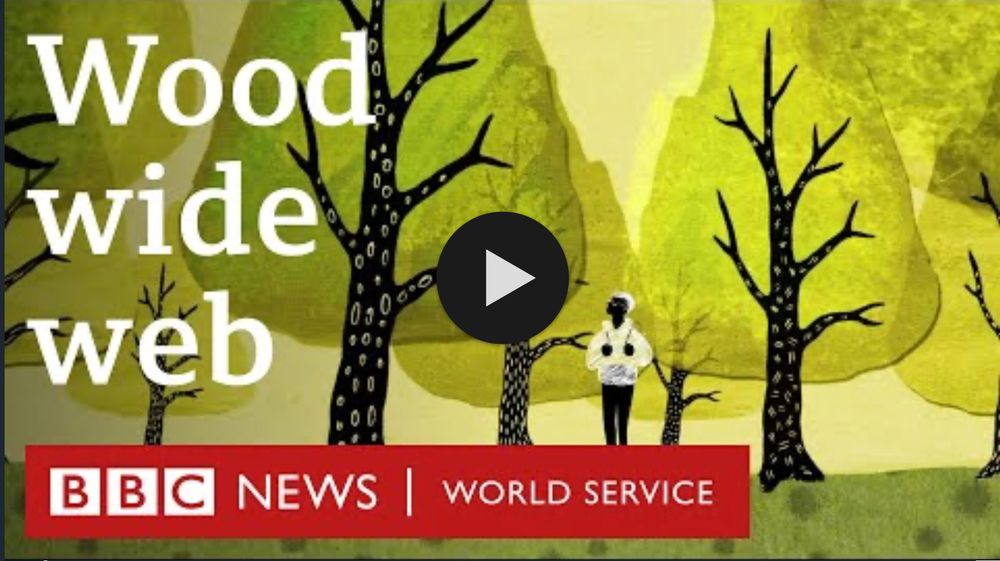
August 4, 2025 at 5:33 PM
After a great summer teaching Social Networks at UCSB, I wanted to share 4 of my favorite network examples we explored in class 🧪🧵
1. Who Will Be the Next Pope?
2. The Hidden Network of Trees 🌳
3. The Beer Graph 🍺
4. The Oracle of Bacon 🥓🎬
1. Who Will Be the Next Pope?
2. The Hidden Network of Trees 🌳
3. The Beer Graph 🍺
4. The Oracle of Bacon 🥓🎬
New study (Campbell & Hawkins, 2025) examines why people expect news to find them on social media (vs seeking it out). Key finding: when people habitually scroll social media w/out thinking + believe algorithms/lack of control drive SM usage, they're more likely to rely on incidental news exposure 🧪
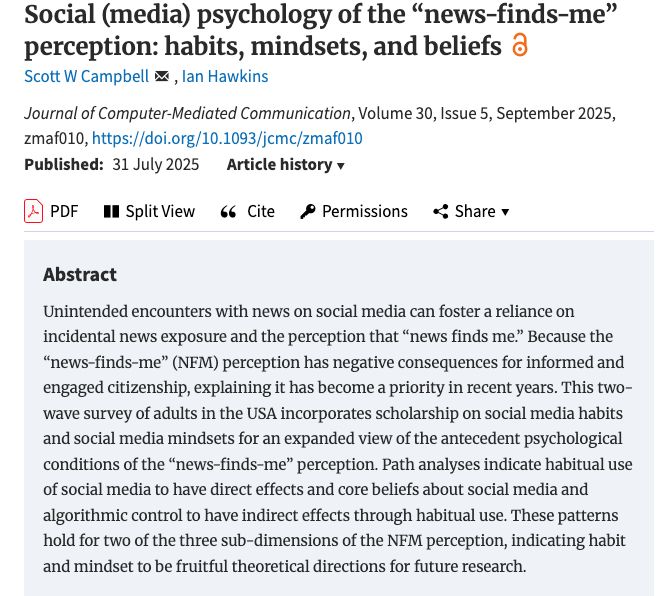
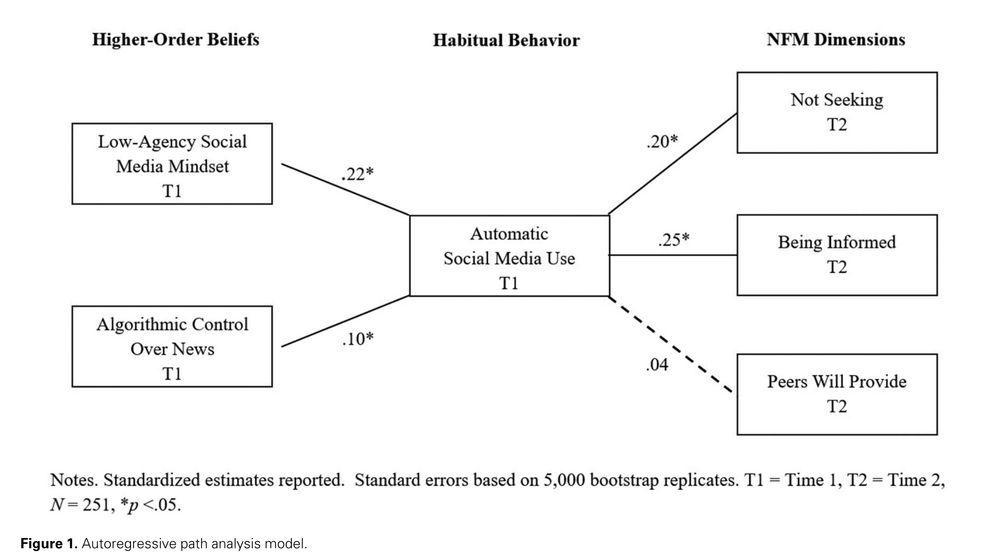
August 1, 2025 at 8:53 PM
New study (Campbell & Hawkins, 2025) examines why people expect news to find them on social media (vs seeking it out). Key finding: when people habitually scroll social media w/out thinking + believe algorithms/lack of control drive SM usage, they're more likely to rely on incidental news exposure 🧪
One of the challenges I've had when studying the effects of algorithmic bias is getting a high-level picture of how bias enters algorithms. Here I offer a simple breakdown of where/how bias can arise across different stages of development as well as some domains where we commonly see bias
2/5 🧵
2/5 🧵
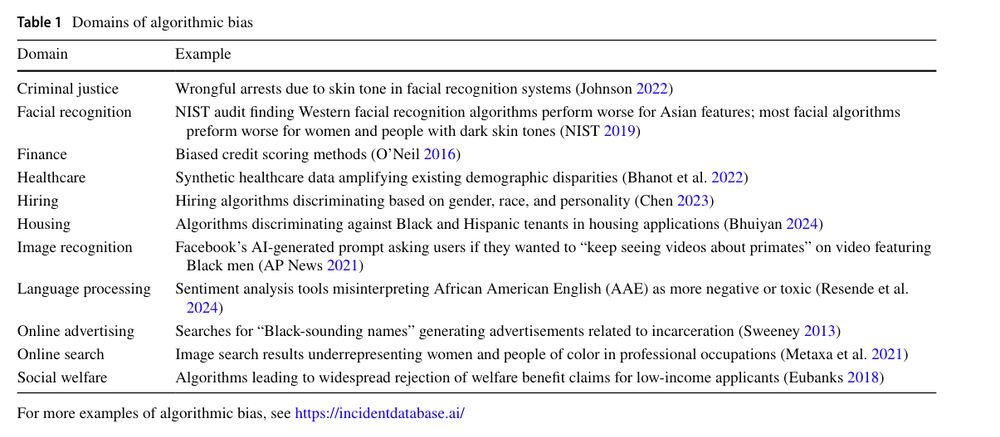
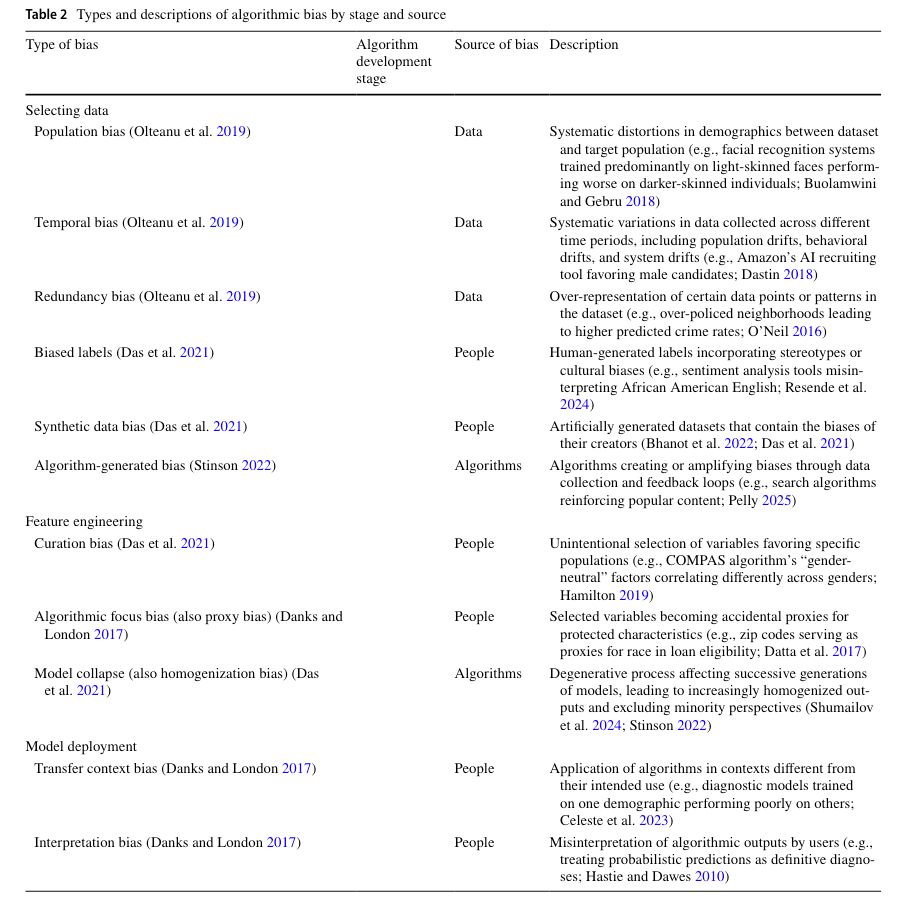
July 27, 2025 at 8:47 PM
One of the challenges I've had when studying the effects of algorithmic bias is getting a high-level picture of how bias enters algorithms. Here I offer a simple breakdown of where/how bias can arise across different stages of development as well as some domains where we commonly see bias
2/5 🧵
2/5 🧵
Excited to share my new work aimed at making algorithmic bias easier to study w/3 key contributions
• Clear overview of how/where algorithmic bias arises
• Workarounds as a concept for user adaptation
• Framework for analyzing bias that is real, perceived, or absent
1/5 🧵🧪
doi.org/10.1007/s001...
• Clear overview of how/where algorithmic bias arises
• Workarounds as a concept for user adaptation
• Framework for analyzing bias that is real, perceived, or absent
1/5 🧵🧪
doi.org/10.1007/s001...
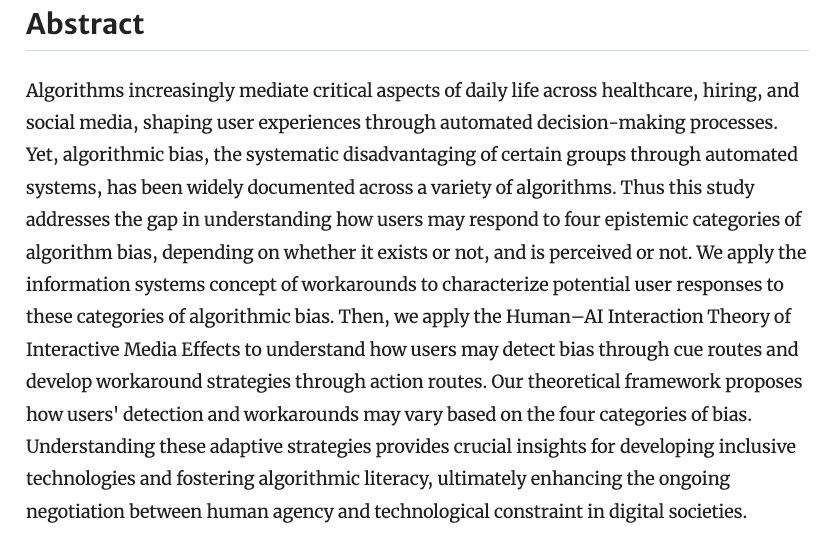
July 27, 2025 at 8:47 PM
Excited to share my new work aimed at making algorithmic bias easier to study w/3 key contributions
• Clear overview of how/where algorithmic bias arises
• Workarounds as a concept for user adaptation
• Framework for analyzing bias that is real, perceived, or absent
1/5 🧵🧪
doi.org/10.1007/s001...
• Clear overview of how/where algorithmic bias arises
• Workarounds as a concept for user adaptation
• Framework for analyzing bias that is real, perceived, or absent
1/5 🧵🧪
doi.org/10.1007/s001...
Paper by @oriplonsky.bsky.social et al., introduces BEAST-GB, merging behavioral decision theory with XGBoost to predict choices under risk/uncertainty. Key finding: behavioral features are critical even with abundant training data, suggesting theory-guided ML beats purely data-driven approaches 🧪
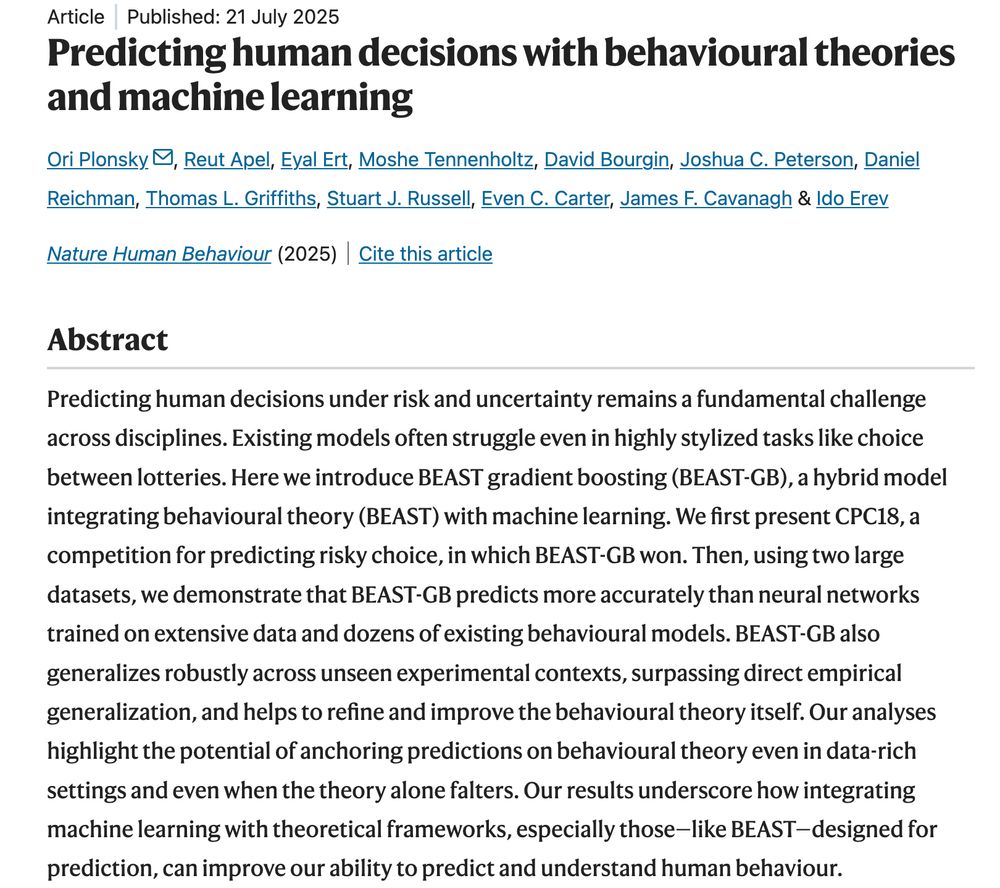
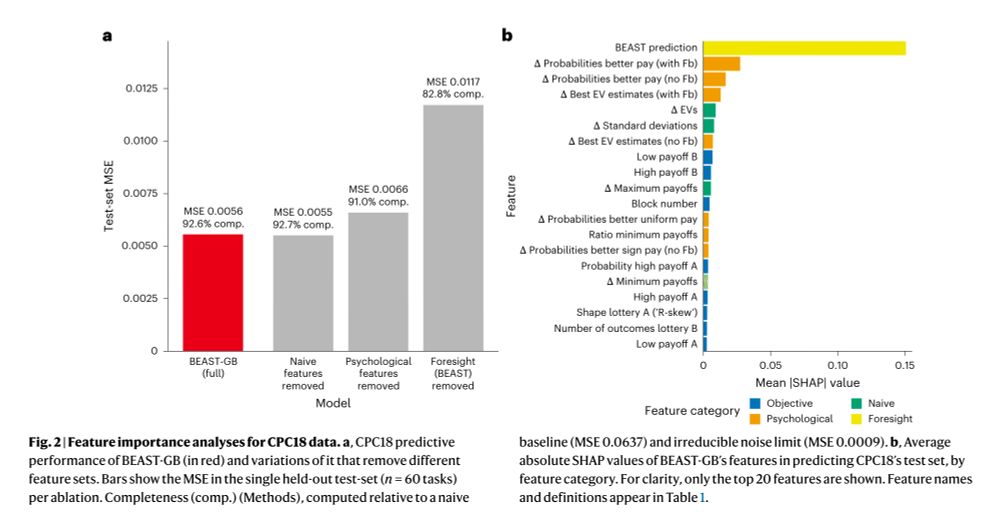
July 22, 2025 at 7:01 PM
Paper by @oriplonsky.bsky.social et al., introduces BEAST-GB, merging behavioral decision theory with XGBoost to predict choices under risk/uncertainty. Key finding: behavioral features are critical even with abundant training data, suggesting theory-guided ML beats purely data-driven approaches 🧪
New paper by Zhang et al. examines algorithmic management (AM) systems identifying 5 perspectives: surveillance/control, neutral tool, agentic boss, socio-technical process, and contradictory unity. AM creates tensions between control vs autonomy, transparency vs opacity & efficiency vs fairness 🧪
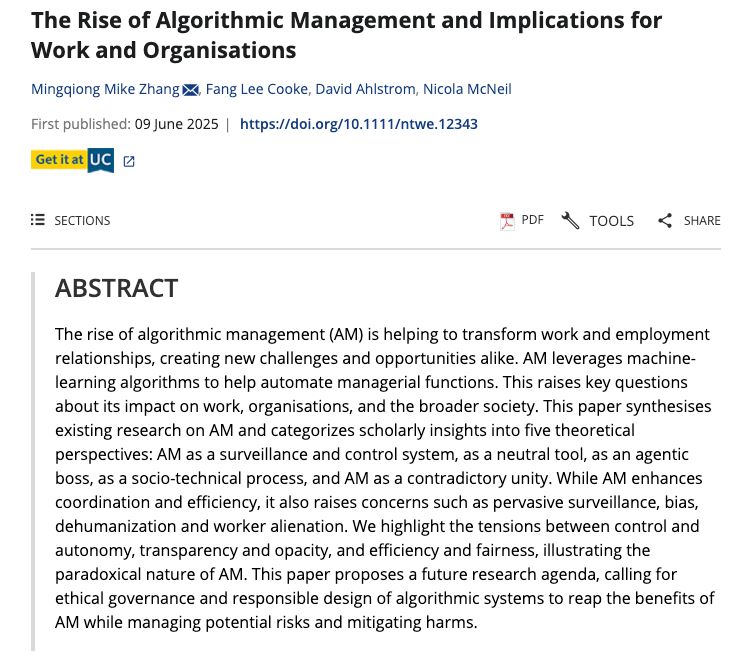
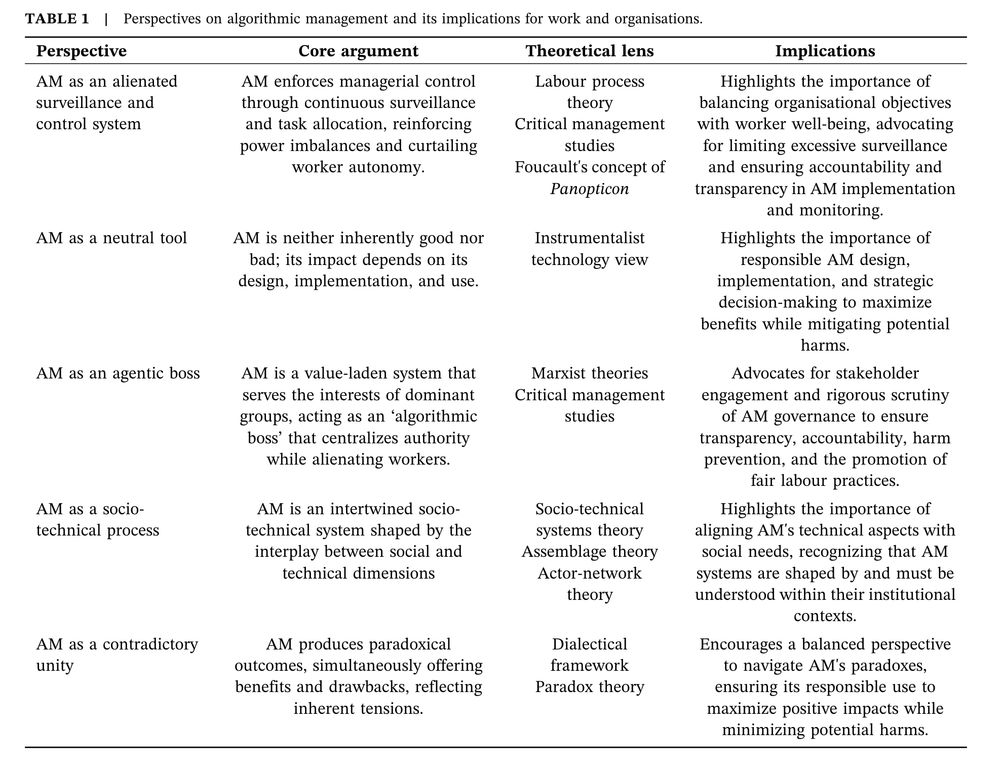
July 8, 2025 at 10:59 PM
New paper by Zhang et al. examines algorithmic management (AM) systems identifying 5 perspectives: surveillance/control, neutral tool, agentic boss, socio-technical process, and contradictory unity. AM creates tensions between control vs autonomy, transparency vs opacity & efficiency vs fairness 🧪
New study (2025) introduces the Capability-Personalization Framework to explain when people prefer AI vs humans. Meta-analysis reveals AI appreciation occurs only when AI seems more capable AND personalization is unnecessary; otherwise people show AI aversion 🧪
doi.org/10.1037/bul0...
doi.org/10.1037/bul0...
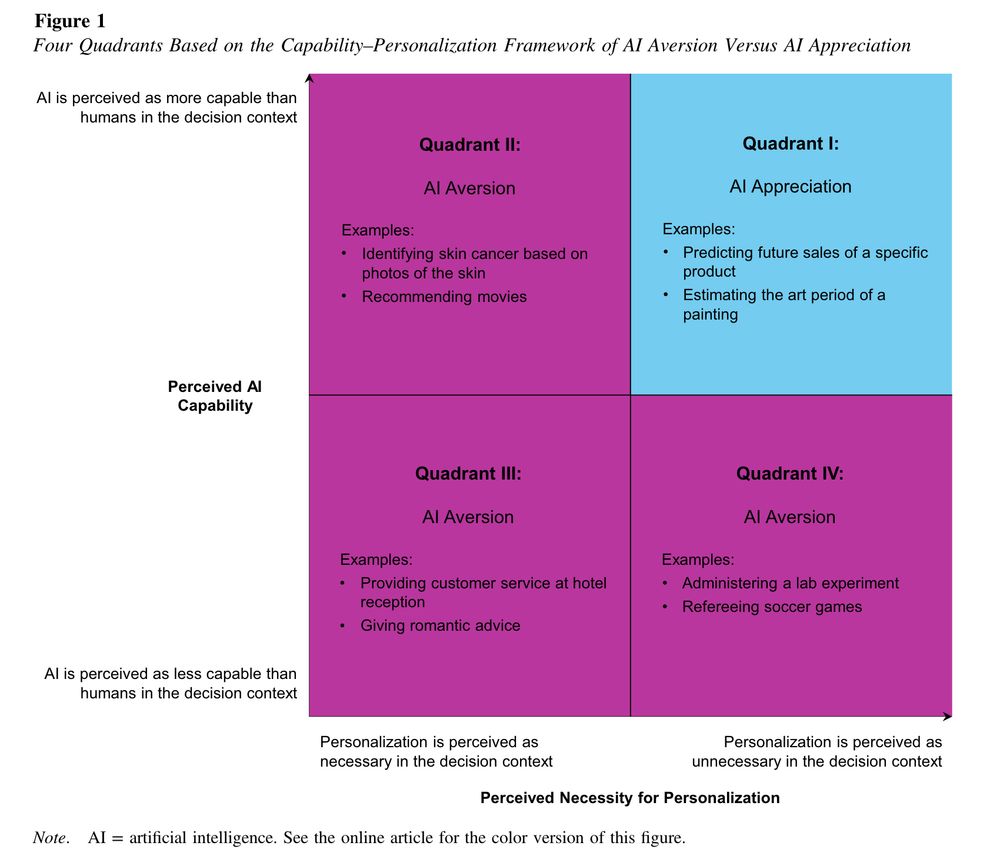
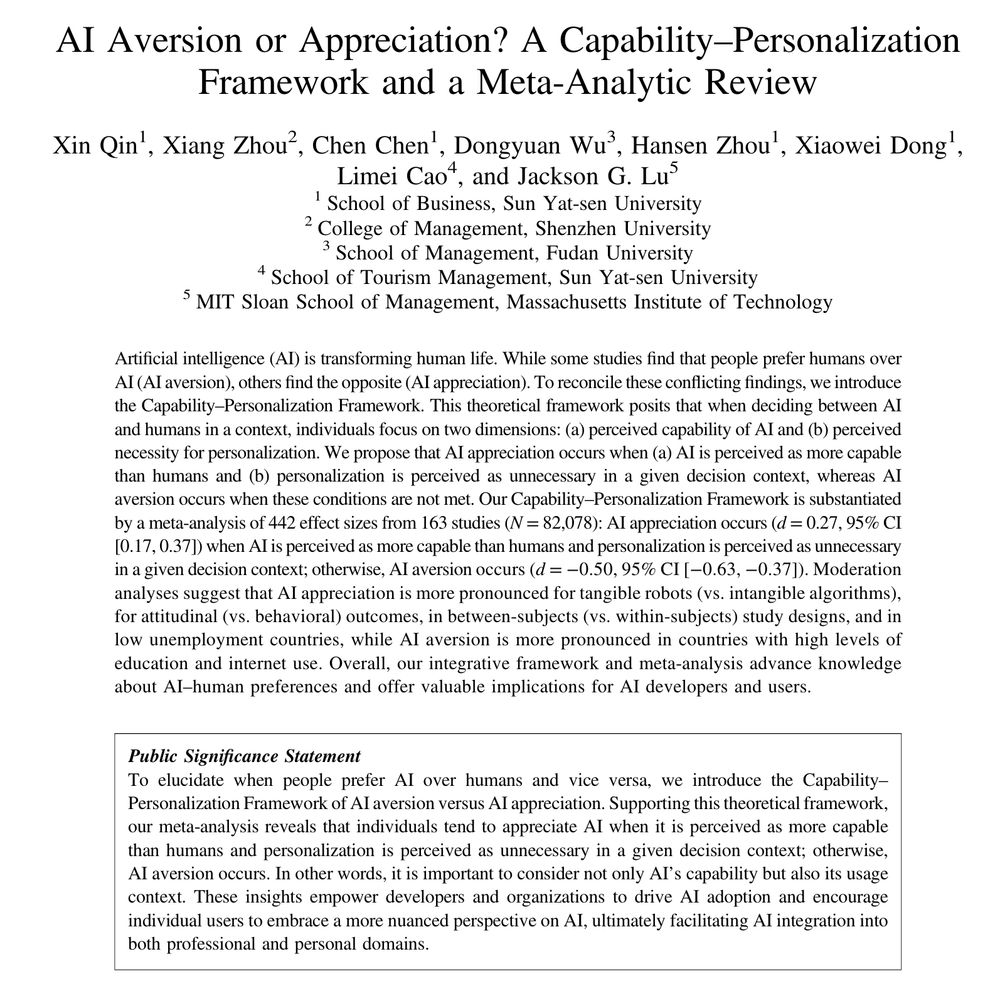
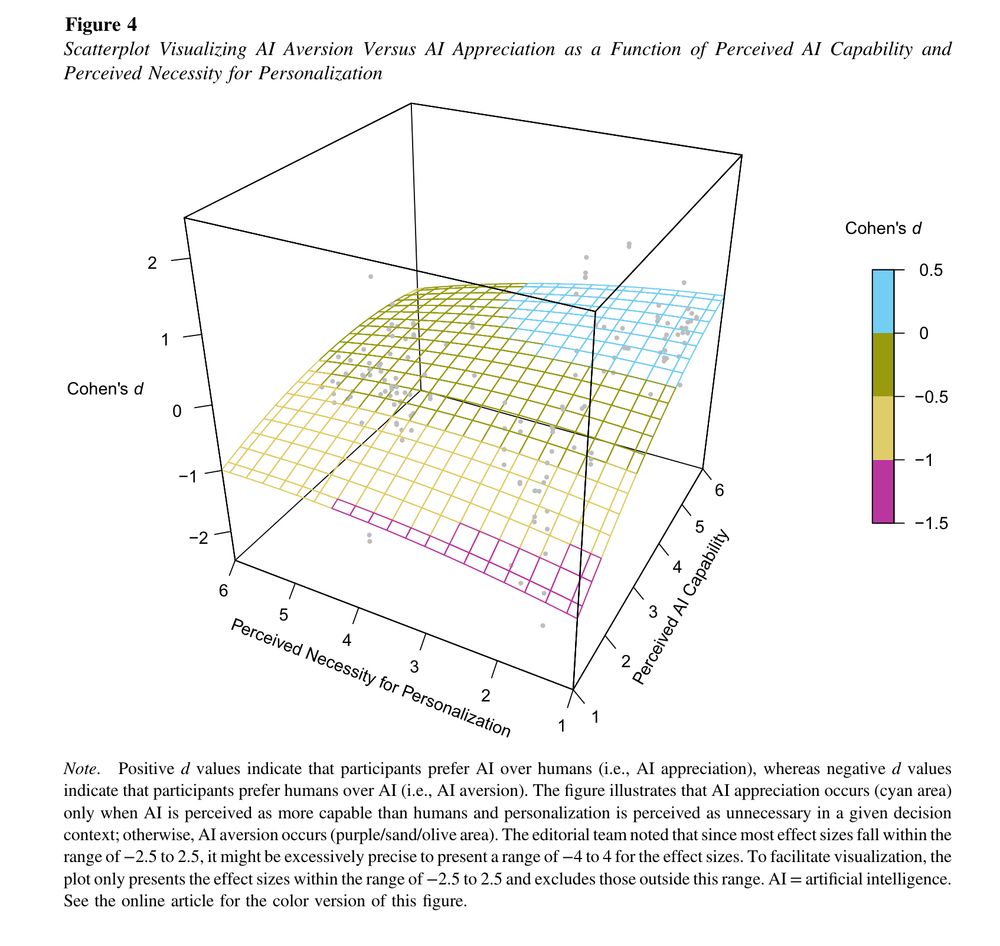
July 3, 2025 at 6:38 PM
New study (2025) introduces the Capability-Personalization Framework to explain when people prefer AI vs humans. Meta-analysis reveals AI appreciation occurs only when AI seems more capable AND personalization is unnecessary; otherwise people show AI aversion 🧪
doi.org/10.1037/bul0...
doi.org/10.1037/bul0...
@rachaelkee.bsky.social blowing us all away with her project at @hackingcommsci.bsky.social. Super impressive project with the goal of collecting high-throughput sleep and media data ✨😴📺
#ICA25
#ICA25
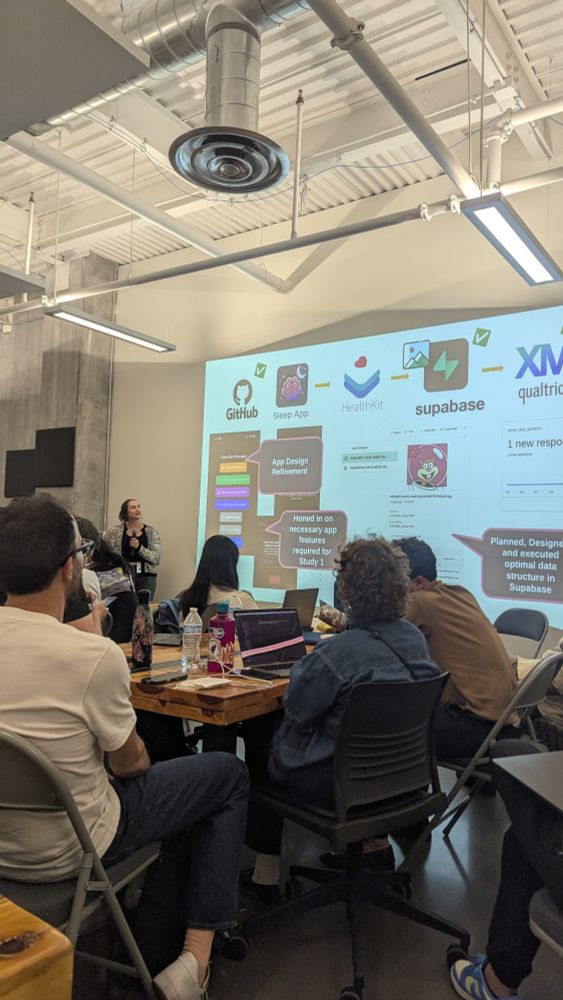
June 12, 2025 at 10:59 PM
@rachaelkee.bsky.social blowing us all away with her project at @hackingcommsci.bsky.social. Super impressive project with the goal of collecting high-throughput sleep and media data ✨😴📺
#ICA25
#ICA25
Great presentation by @kyliewoodman.bsky.social on fMRI analysis at @hackingcommsci.bsky.social. I am always blown away by how clearly Kylie is able explain complex topics
#ICA25
#ICA25
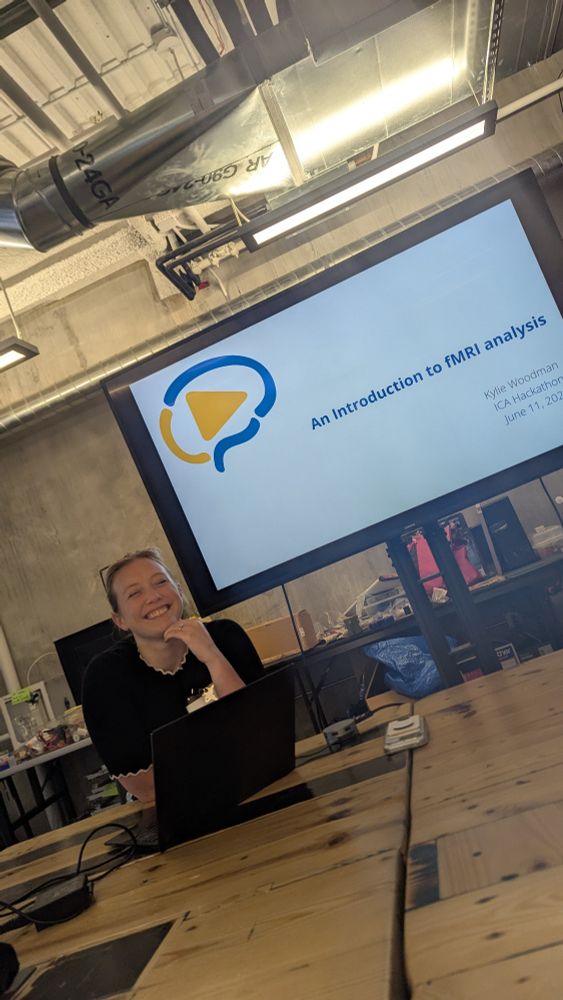
June 11, 2025 at 10:18 PM
Great presentation by @kyliewoodman.bsky.social on fMRI analysis at @hackingcommsci.bsky.social. I am always blown away by how clearly Kylie is able explain complex topics
#ICA25
#ICA25
Absolutely brilliant paper by @wankepan.bsky.social that solves a major barrier to drift-diffusion modeling by introducing dockerHDDM: a user-friendly Docker environment with easy installation, Apple chip compatibility, and modern Bayesian tools. The paper is also an excellent introduction to DDMs 🧪
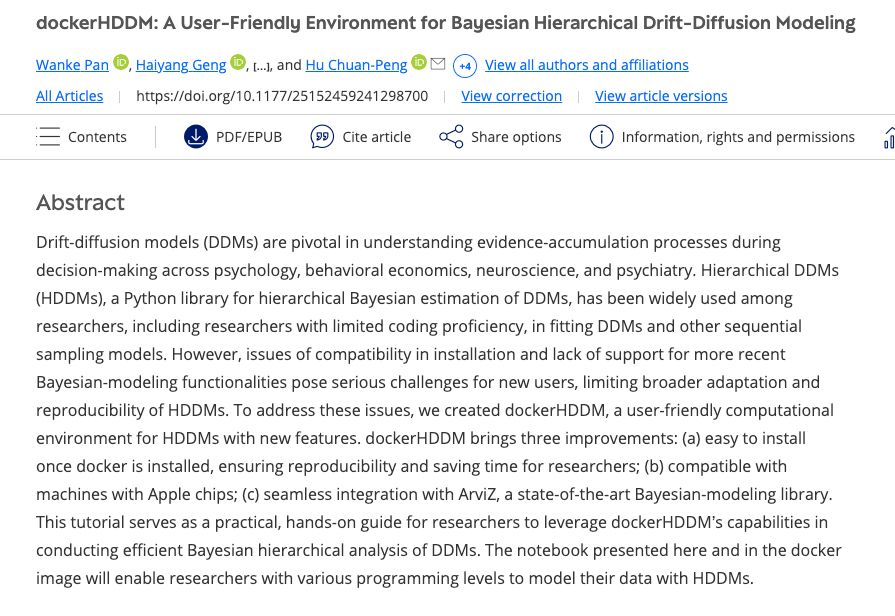


May 27, 2025 at 8:11 PM
Absolutely brilliant paper by @wankepan.bsky.social that solves a major barrier to drift-diffusion modeling by introducing dockerHDDM: a user-friendly Docker environment with easy installation, Apple chip compatibility, and modern Bayesian tools. The paper is also an excellent introduction to DDMs 🧪
New study (2025) shows computer access is the strongest predictor of beneficial internet use, surpassing smartphones & in-home internet. Households with a computer but no internet still fared better than those with internet but no computer; device quality explained additional variance 🧪
#commsky
#commsky

May 22, 2025 at 3:55 PM
New study (2025) shows computer access is the strongest predictor of beneficial internet use, surpassing smartphones & in-home internet. Households with a computer but no internet still fared better than those with internet but no computer; device quality explained additional variance 🧪
#commsky
#commsky
Study by @janpfa.bsky.social found people can tell true from false news across 40 countries, n=194,438; true news was rated as more accurate than false news. Political concordance didn't affect discernment; people are not gullible of news they agree with but are skeptical of news they disagree with🧪


May 7, 2025 at 9:57 PM
Study by @janpfa.bsky.social found people can tell true from false news across 40 countries, n=194,438; true news was rated as more accurate than false news. Political concordance didn't affect discernment; people are not gullible of news they agree with but are skeptical of news they disagree with🧪
New study (2025) shows political affiliation is the strongest predictor of immigration views in 2020 election. High-income states and areas with more foreign residents showed more pro-immigration views. Anti-immigration tweets cited threats while pro-immigration focused on humanitarian concerns 🧪



April 28, 2025 at 6:12 PM
New study (2025) shows political affiliation is the strongest predictor of immigration views in 2020 election. High-income states and areas with more foreign residents showed more pro-immigration views. Anti-immigration tweets cited threats while pro-immigration focused on humanitarian concerns 🧪
New study finds that datafication in newsrooms creates "coopetition" where journalists cooperate & compete. While data illuminate work outcomes journalists employ flexible interpretation strategies - embracing data when beneficial (data opportunism) while questioning it when not (data skepticism) 🧪

April 23, 2025 at 9:56 PM
New study finds that datafication in newsrooms creates "coopetition" where journalists cooperate & compete. While data illuminate work outcomes journalists employ flexible interpretation strategies - embracing data when beneficial (data opportunism) while questioning it when not (data skepticism) 🧪
Excellent study by @vukasin.bsky.social (2025) finds US liberals trust scientists more than conservatives across all fields. Despite generally high trust levels overall, the gap is largest for climatologists. 5 interventions failed to increase trust, suggesting attitudes resistant to interventions 🧪
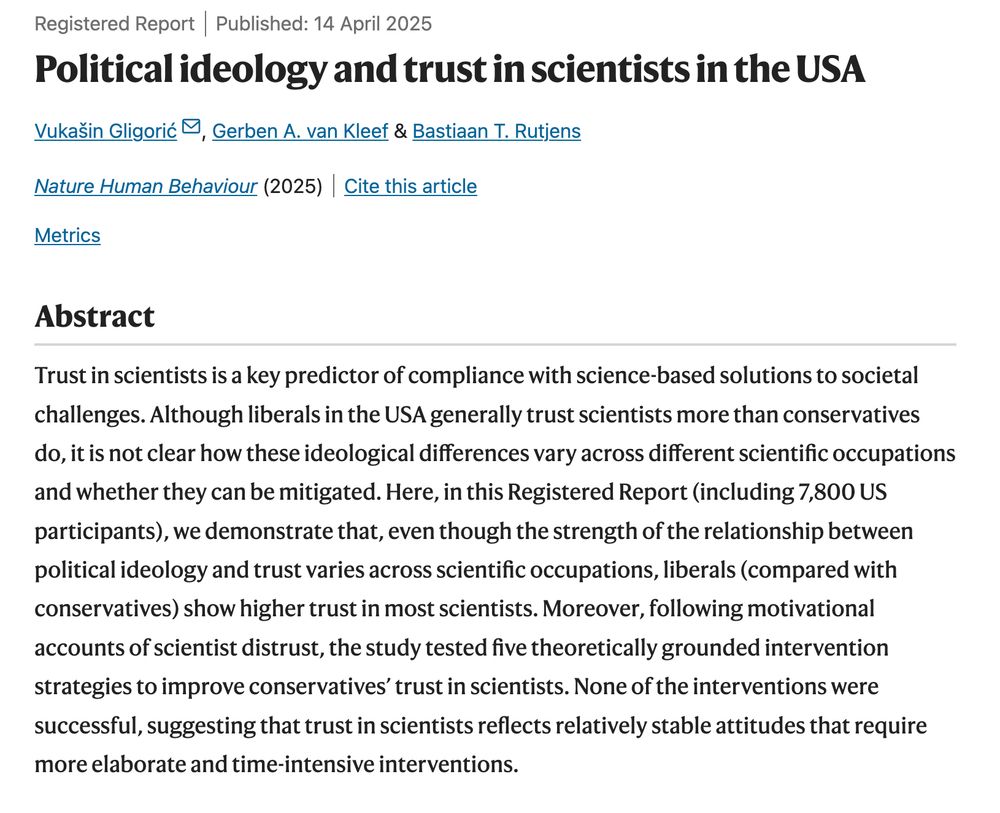


April 15, 2025 at 12:34 AM
Excellent study by @vukasin.bsky.social (2025) finds US liberals trust scientists more than conservatives across all fields. Despite generally high trust levels overall, the gap is largest for climatologists. 5 interventions failed to increase trust, suggesting attitudes resistant to interventions 🧪


